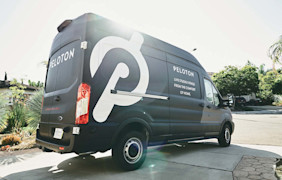Team @ Peloton
Power Moves: How Johnny Cruz Builds a Community to Make Change
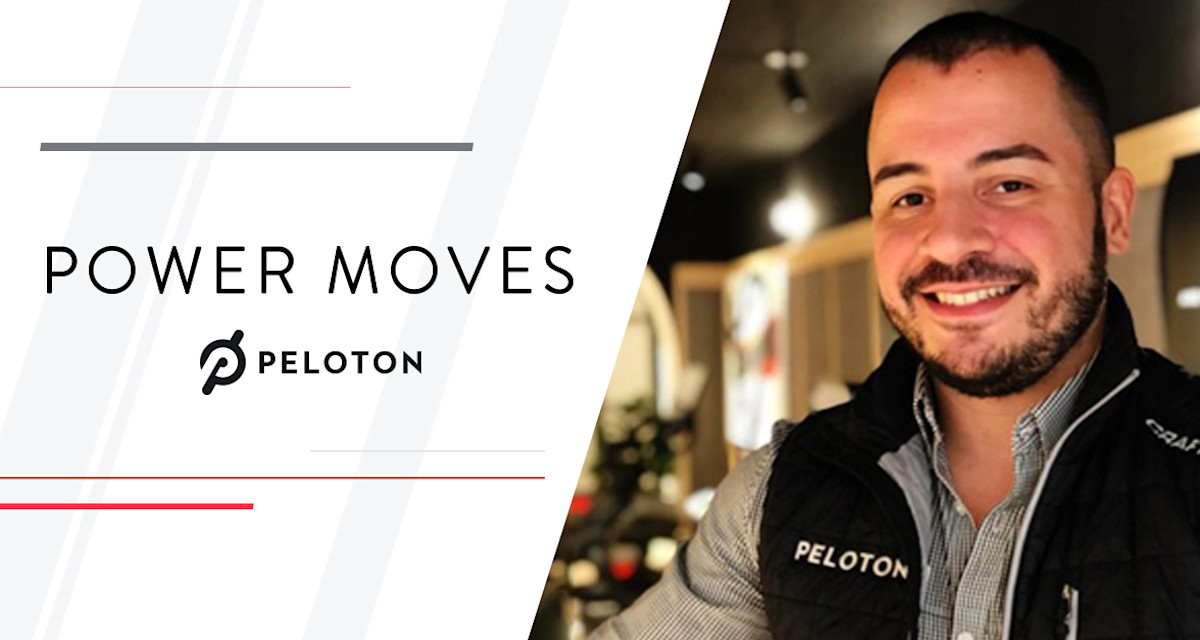
When Johnny Cruz first joined Peloton, he was faced with an ambitious proposal: even though he was brand new to the company and had never worked in a commission-based role, an offer was on the table to run two new showrooms in Manhattan. It was only Johnny’s first month, but he went for it anyway, and in three years he earned the title of regional sales manager for the Northeast region.
“My first six months were probably the hardest six months,” he said. “I almost left Peloton because at that time, our team was still very new and our resources were not as built out as they are now. I wasn’t sure that I would be able to be successful, and I felt like I was just running my tires in the mud. But I felt like I had a Ferrari, so why was I stuck?”
The key to getting out of the mud? Making connections with his fellow Peloton team members. He’s taken what he learned those first six months and used it to build his team, or, as he puts it, to build his family.
We caught up with Johnny to talk about his career with Peloton and the kind of interpersonal connections it takes to go far together in the retail market.
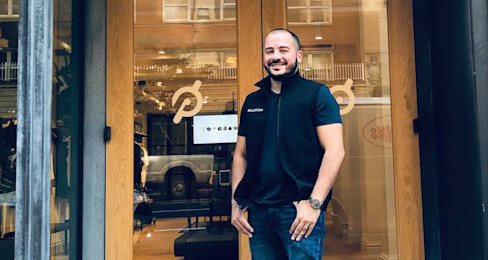
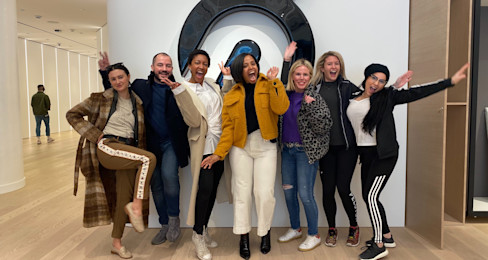
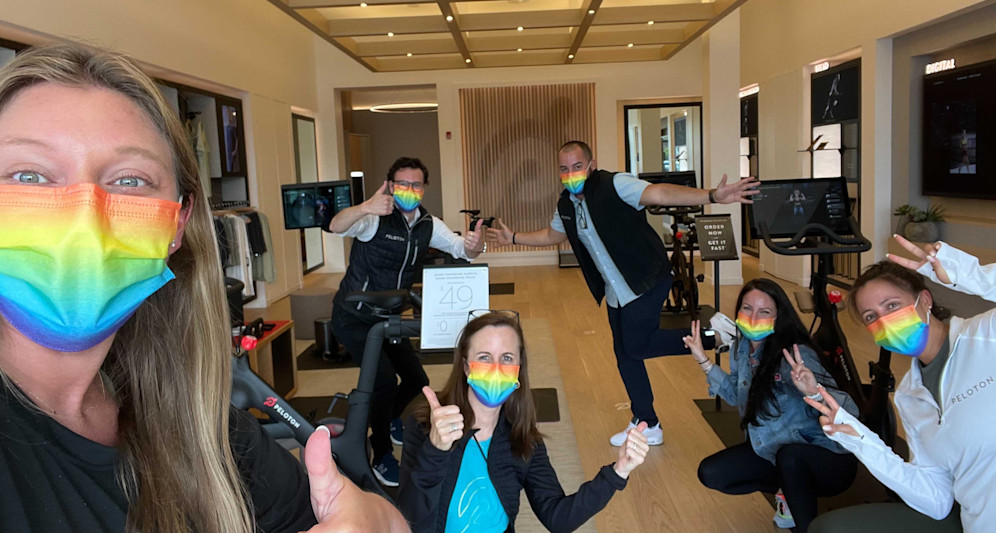
All images above were taken before the onset of COVID-19, with the exception of photo #3 in which employees are wearing masks and practicing social distancing.
How long have you been with Peloton and how did you get started?
I just made three years on the 21st of May! I was hired to be the showroom manager of our Tread studio at Christopher Street. I onboarded at Madison Avenue, which also didn't have a showroom manager. In my onboarding, my boss asked me, Would you like to work at the Tread studio or do you want to stay at Madison Avenue?
It was my first time being in a commission role. I didn't understand traffic and trends yet, and Christopher Street was new and the Tread was new and we weren’t selling it, so there were a lot of unknowns. But my mentor said, Well, what about running both?
I was put on a two-month trial during the summer to see if I could successfully run two locations. This wasn’t a traditional setup, and if I could prove cultural and sales success over the summer—the slowest season—I would be one of the few multi-showroom leaders at Peloton. If you're going to be on a trial in the sales world, you never want it to be during the summer, but it gave me a great opportunity to really look within and really lead the team. They saw what I did, and the rest was history. That September, they offered me both positions officially. So I ran the Tread Studio, which was a cool, different experience, and then I ran the Madison Avenue Upper East Side retail showroom.
How have you seen the company change over the last few years?
A big one is definitely resources. We’ve grown a lot and I’ve seen us have to scale people, systems, and processes to keep up with our growth.
In the past, there was this feeling of, well, when I give feedback, it’s heard. I could meet with the SVP and talk business and I could have these strong relationships, but as the company continues to grow, would we lose that? That was my biggest fear. I thought, "This is too good to be true, right? It must be because they're small and they're private.
As we went public and as we increased the investment in our teams, it only became more clear that Peloton was investing resources to ensure we are upholding all the values that we focus on as a company and as a leadership team. We don't just say we want to be the best company to work for. We are actually committed to it.
Although the company is not perfect—no company is—they do a hell of a job of adding resources where people ask for them. That separates Peloton from the rest, and it’s what keeps me here.
It sounds like you feel that people are really heard here.
Yeah. Being heard makes you feel like what you're saying—it doesn't mean that it's right, but it does mean that it's valued. And when it's valued, it gives you the confidence to continue to speak. And when you’ve got the confidence to continue to speak, all of a sudden you open your eyes and you find out you're being the genuine version of yourself that you've never been able to share at work.
And then you realize that as you become more and more of who you are, you are valued even more because of it. That allows you break through that wall of insecurity and be vulnerable and humble and embrace who you are.
I think that's been my biggest learning, that this company truly values you for who you are. You actually become more successful because embracing who you are gives you confidence and confidence gives you success.
What’s your day-to-day like at Peloton?
My days are usually invested in the team. If I'm in the stores, I'm investing my time not just in the leadership team, but the sales specialist team too. I’m having conversations about their future, their development, what they're doing now, not just saying, Hey, how's your “warm welcome” (aka best-in-class customer greetings) going with Members? How are you connecting? That's part of the conversation, but I find more value in inspiration and providing to them what was provided to me.
How would you describe the culture?
When it comes down to the culture, it’s based on the values, and the values we really focus on are together we go far and empower a team of smart creatives.
I alone can't be there for everyone, but I expect everyone to be there for everyone. Be kind to each other, connect with each other, respect each other, learn about each other, and then share business best practices to drive sales.
Can you share an example of how culture has created progress?
When I took over the Northeast, it was a head-scratcher. How do I have so many smart, motivated people, but the region is underperforming? It just didn’t make sense.
What I realized was that all those amazing team members didn’t talk to each other because there was a lack of vulnerability. So I really focused on pushing vulnerability and psychological safety, and they started to learn more about each other.
If you look at the Northeast today, it's a region based on community and connection versus just results. Of course, we like to celebrate our number-one and number-two rankings, but that's a reflection of our connection, not a reflection of us just working really, really hard.
What does it take to really thrive in retail at Peloton? What do you look for when hiring new team members?
There are a few things. They have to be able to carry a conversation with me. If you can't carry a conversation with me, how can I expect you to carry a conversation and connect to anyone else? It doesn't mean that you have to be an extrovert. I think introverts have a unique ability to connect in their own way.
I look at people who have diverse experiences. People who have been on team sports, part of extracurricular activities, or their versions of ERGs [employee resource groups]. Simply put, I look for people I don't already have and that can add value to the team.
You can't expect change if you don't intentionally add in change, and change often comes from people. That’s a big focus for me.
Interested in working at Peloton? Check out our open roles here.
